
Subscribe & Follow
Jobs
- Head of Performance Marketing South Africa
- LinkedIn Outreach Assistant - Remote Cape Town
- Creative Content Video Editor Johannesburg
- Influencer Campaign Manager Cape Town
- Pioneering Coordinator Cape Town
- Social Media Manager Cape Town
- Video Editor for Social Media Content Cape Town
- Social Media Manager and Strategist Cape Town
- Junior Digital Art and Social Media Marketing Coordinator Johannesburg
- Multi Media Journalist | South Coast Sun Durban
The new social networks
Move over Facebook and WhatsApp; there are new social networks on the block and they have been taking the world by storm. In the midst of the Covid-19 pandemic, new social media platforms have been welcomed with open arms by online users, in a search for new and meaningful ways to connect differently to usual social media platforms like Instagram and Facebook.

Although Omegle, Clubhouse and Telegram existed long before the pandemic, 2020 saw these platforms boom among Gen Z and millennials across the globe. Meltwater, the leading media monitoring and social analytics company, tracked and analysed social media data to take a look at how these new social networks are outshining the old in the age of uncertainty.
Omegle
Launched in March 2009, Omegle is a free online chat website that randomly pairs users in one-on-one chat sessions, with conversations taking place anonymously.
During the course of 2020, there were three key moments where social media mentions on ‘Omegle’ peaked worldwide.
The first was in April 2020, where the data recorded just over 40,000 social media mentions on ‘Omegle’. This was due to high interest in a woman, dubbed ‘Crazy Cat Lady’, and her animal abuse videos. Other mentions include users on Reddit asking for people’s experience of the platform as lockdown restrictions were implemented around the same time.
In July 2020, the data recorded more than 45,000 social media mentions on ‘Omegle’. Mentions around this time include one social user going viral for meeting American beauty YouTuber and influencer, James Charles, as well as users beginning to share their experiences on the platform - both good and bad.
December 2020 saw the highest number of mentions related to ‘Omegle’, with just over 56,000 social media mentions and reaching 252 million people. One Reddit discussion highlighted how Omegle is primarily being used by Gen Z’s while most online users shared YouTube video content that looked back on their Omegle experience throughout 2020.

The majority of ‘Omegle’ social media mentions are coming from the United States of America (USA), followed by Brazil and the Philippines to round up the top three countries mentioning ‘Omegle’ the most.
Reasons for the mentions surrounding the social network within these three countries range from users in the Philippines using ‘Omegle’ to find love similarly to Tinder, to users in Brazil finding the platform a great way to meet new people. In the USA, mentions on ‘Omegle’ from users include how President Donald Trump has been banned from the platform (although this was never officially verified or confirmed), while other users are warning against the use of the platform (particularly around the dangers of actually talking to strangers).
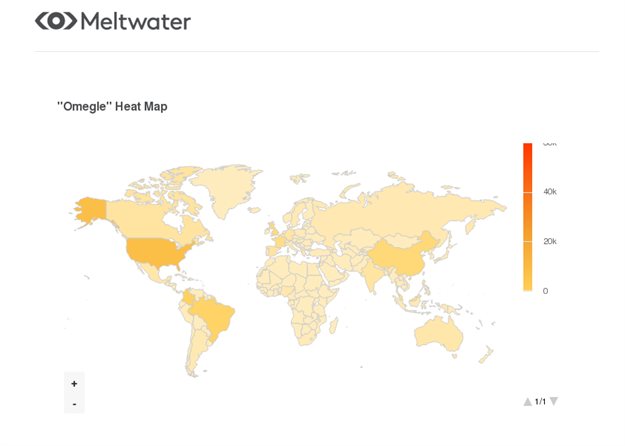
Since global mentions on ‘Omegle’ peaked the most during December 2020, some of the trending themes to emerge during this period include:
- “Cancer patient”, which refers to this Reddit discussion on a livestreamer berating a cancer patient on Omegle
- “LSD trip”, which refers to another Reddit discussion regarding Omegle strangers ending up at a McDonald’s after taking hallucinogenic drugs.
- “Questions or concerns”, which refers to some online user’s general feelings towards the platform
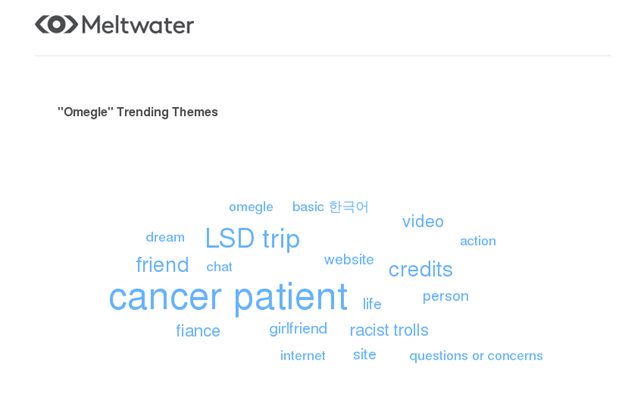
While Omegle isn’t a new social networking platform, it certainly gained much attention from online users looking for new ways to connect with others during the pandemic. However, despite its growing popularity, not everyone is onboard with using ‘Omegle’.
Given the great concern around the dangers of using the chat website, this could be one of the reasons why feelings towards ‘Omegle’ are negative. The sexually crude and predatory nature of the social network is also a reason why online users are not a fan of it.
However, the 15.6% of social media users that like ‘Omegle’ feel this way because of how it has been helpful in socialising and meeting new people, as well as maintaining their social skills during the pandemic, as this Twitter user described.
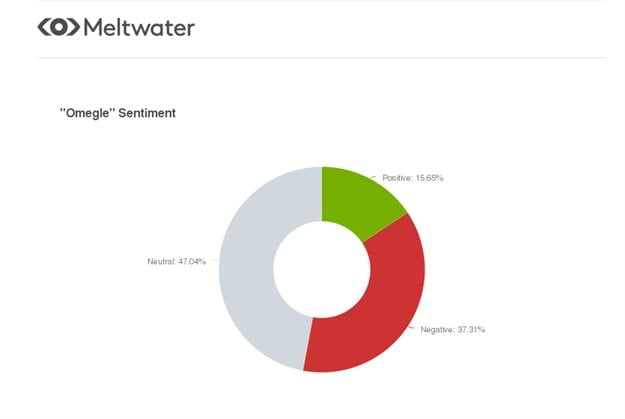
Clubhouse
Launched in 2016, Clubhouse is a new social networking platform that is based on voice, and allows users from around the world to come together to talk, listen and learn from one another in real-time.
In contrast to both social volume and social reach for Omegle, mentions on ‘Clubhouse’ have garnered a consistent social reach of over one billion people worldwide since April 2020, with the highest global reach being just under three billion people in August 2020. During this time, the data recorded 165,000 social media mentions on ‘Clubhouse’, as the app began to gain popularity among high profile individuals.
By December 2020, the data recorded the highest number of ‘Clubhouse’ mentions - 221,000 - as most online users had become familiar with the app and were now taking a bigger interest in how the social networking platform worked.
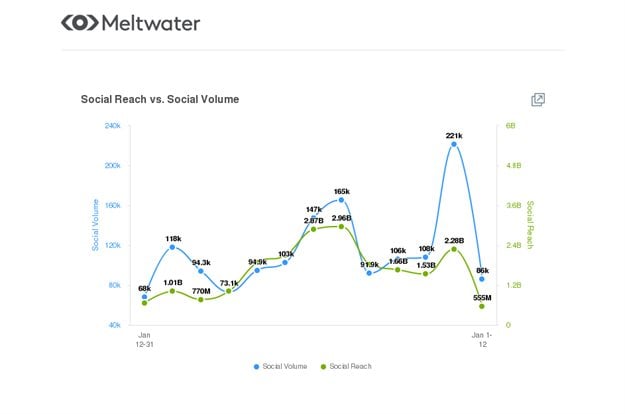
The majority of ‘Clubhouse’ social media mentions came from the USA (26.2%), followed by the United Kingdom (UK), Canada, Nigeria and India, making these the top five countries to be mentioning the app the most on social media.
Overall, mentions on ‘Clubhouse’ from the USA have been related to sharing, which high profile celebrities or influencers were hosting discussions on various rooms, and social media was used to either advertise the room or encourage people to get invites to join discussions. The data also showed similar tweets from users in the UK doing the same.
In Canada, most users are still trying to understand how the app works and use social media to query this, while in Nigeria, online users like the interactive discussions that take place on the platform. In India, online users have shown interest in Clubhouse’s potential to replace other audio-based apps, and become a leading app this year.
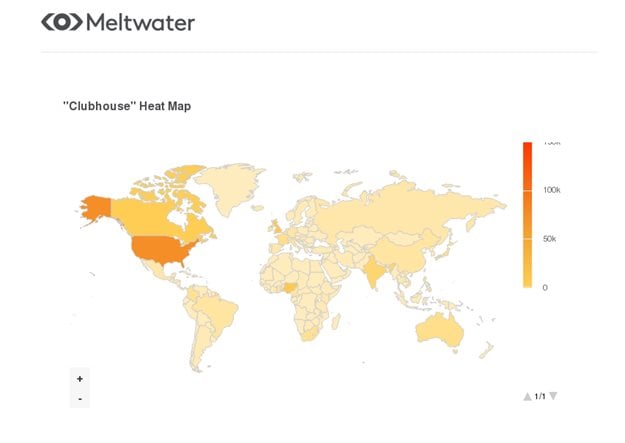
Taking a closer look at the high social volume of ‘Clubhouse’ mentions during December 2020, some of the trending themes included:
- “Clubhouse room”, which refers to different rooms in the app that users can enter, by invitation only, to participate in discussions.
- “Biggest social media tool” and “misinformation”, which refers to this tweet by @DomoWarren regarding the app’s potential to be misleading.
- “Invite” and “phone”, which refers to the ways in which you can access the platform.
Another interesting contrast to ‘Omegle’ is that ‘Clubhouse’ has had more global social media mentions during 2020, as compared to the one-on-one, strangers only social network. Despite some users not being too fond of the exclusivity that comes with Clubhouse - such as needing an invite to access discussions, or that it is a mobile only platform - the data indicates that in general, users favour ’Clubhouse’ more for the variety of discussions people can have on a number of topics, and to do so with high profile individuals. Meeting more people in ‘Clubhouse’ rooms also emerged as a reason why the app has been receiving mentions. And positive ones at that.

While the majority of users remain undecided about their feelings towards ‘Clubhouse’, 18.5% of social media users do like the app and enjoy the discussions they have been able to participate in thus far. At least 13.8% of social media users aren’t so fond of the app due to how one accesses the platform exclusively as one Twitter user mentioned. Social media users also aren’t fans of the platform because of the misinformation the app spreads.
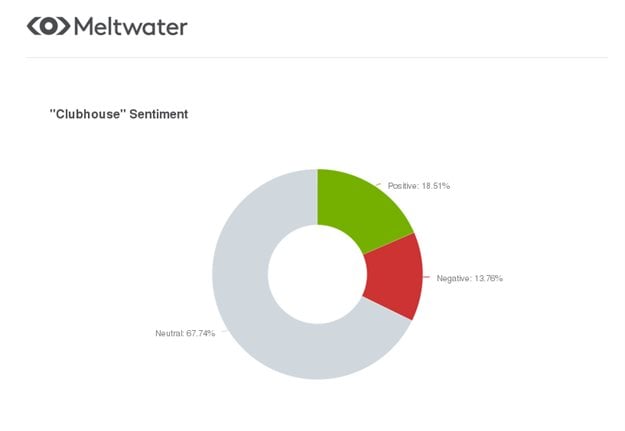
Telegram
Telegram is also not a stranger to the online world, as the app has been around since 2013. However, after WhatsApp recently made the announcement regarding its new privacy policy on 4 January 2021, many people took to social media to share how they would consider switching to Telegram instead.
Since the start of January 2020, there have been over one million social media mentions on ‘Telegram’, and these mentions have been increasing, with the most significant increase occurring on 4 January 2020.
On this day, the social volume of ‘Telegram’ mentions increased by 34% and the social reach increased by 39%. This was the day that WhatsApp announced their policy changes, and the data recorded more than 72,000 global social ‘Telegram’ mentions, which had a global social reach of 1.9 billion people.
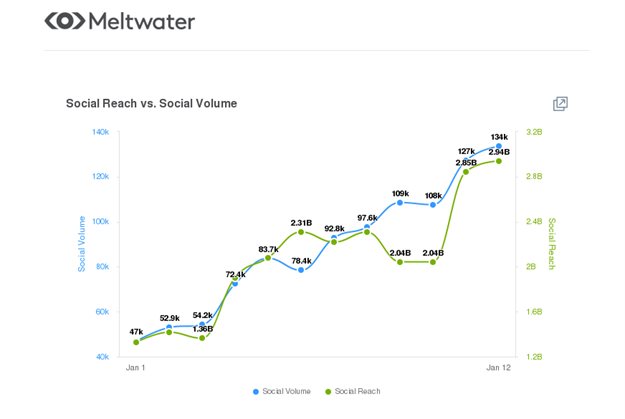
WhatsApp, on the other hand, has been mentioned over three million times on social media, in relation to its new privacy policy. These mentions saw an increase on 4 January 2020 where the data recorded more than 250,000 social media mentions on the day. As the graph indicates below, these mentions on WhatsApp had some impact on the ‘Telegram’ mentions recorded on the same day.

While 79.1% of all ‘Telegram’ mentions were neutral in sentiment, this was primarily due to natural language processing attributing a Neutral sentiment score to social media mentions in different languages and using a number of emojis. However, from what the data could provide a sentiment analysis on, 10.6% of online users feel positive towards ‘Telegram’ while 10.3% of online users feel negative.
Those who like ‘Telegram’ prefer it for its enhanced security, as well as having surpassed 500 million active users on the platform. The negative sentiment is attributed to mentions surrounding tech giant, Apple, potentially muting the app on their devices, as well as the data picking up on ‘Telegram’ mentions that included the keywords ‘WhatsApp’, ‘hate’, ‘leaving’ or ‘migrating’.
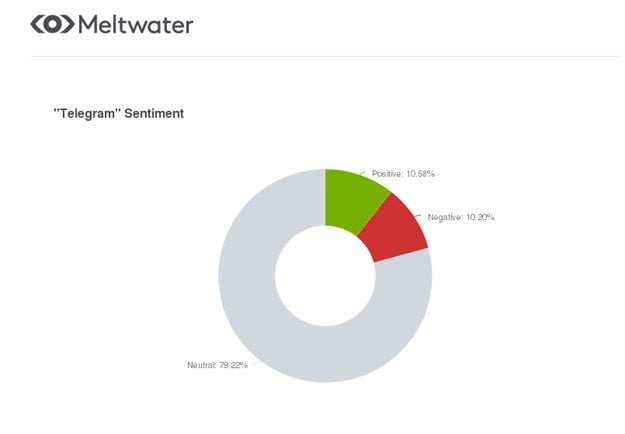
While none of these social networking platforms are new in their creation, they certainly are the new platforms that people have taken a keen interest in as a way of connecting with other people as the pandemic continues to restrict physical interaction.
Time will tell just how these apps will continue to grow throughout 2021 but perhaps it is safe to say that these new social networking platforms have the potential to take over as the new social networks.
If you want to get insights like these to monitor trending topics in news and social media about your brand, business, industry or competitors, you can contact the Meltwater Team here.
Source: Data gathered by Meltwater from 12 January 2020 to 12 January 2021.
About Meltwater
Meltwater is a leading global provider of social and media intelligence. By examining millions of posts each day from social media platforms, blogs and news sites, Meltwater helps companies make better, more informed decisions based on insight from the outside. Meltwater was founded in Oslo, Norway, in 2001 and is headquartered in San Francisco, California, with 50 offices across six continents. The company has 1,700 employees and 28,000 corporate customers, including industry leaders in several sectors.
For more information visit meltwater.com
- South Africa’s digital landscape maturation in 2024: Insights from the 2024 Global Digital Report27 Mar 14:09
- Black Friday media coverage 202301 Dec 12:19
- Springboks media coverage at the RWC 202302 Nov 09:23
- How to use technology to prepare for Black Friday01 Nov 13:00
- B2B and TikTok - more compatible than expected?05 Sep 11:34






















